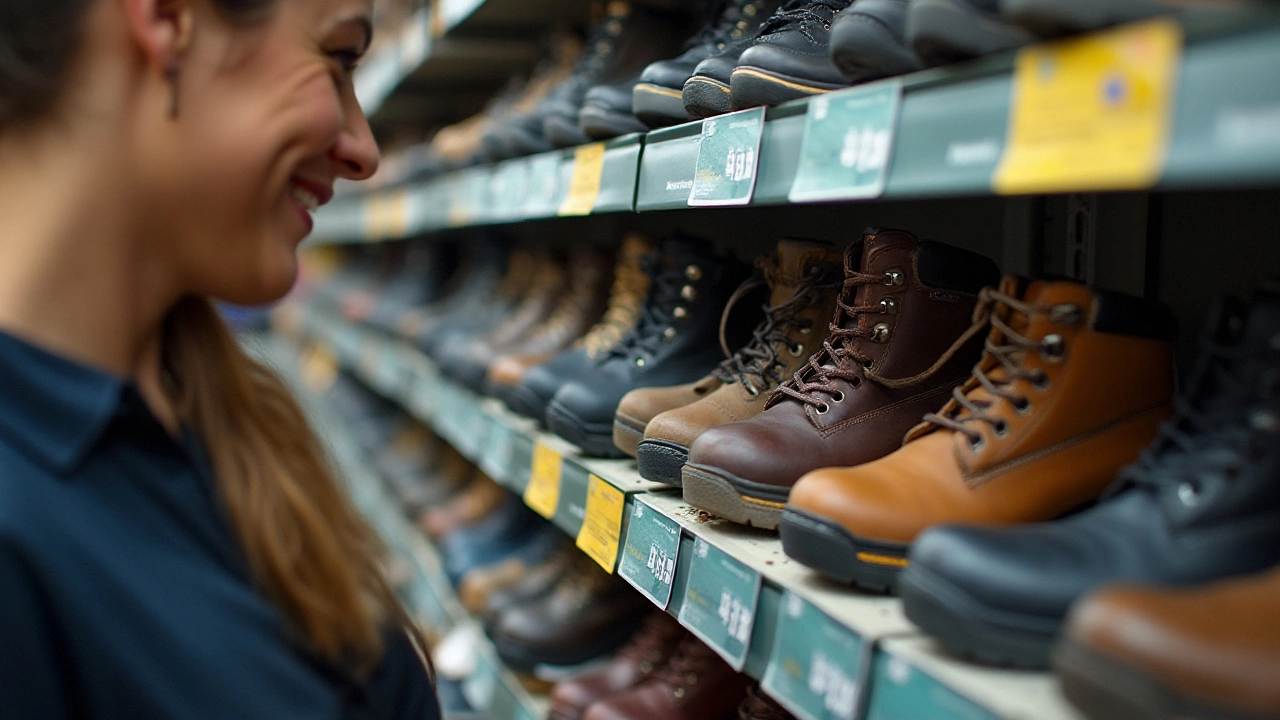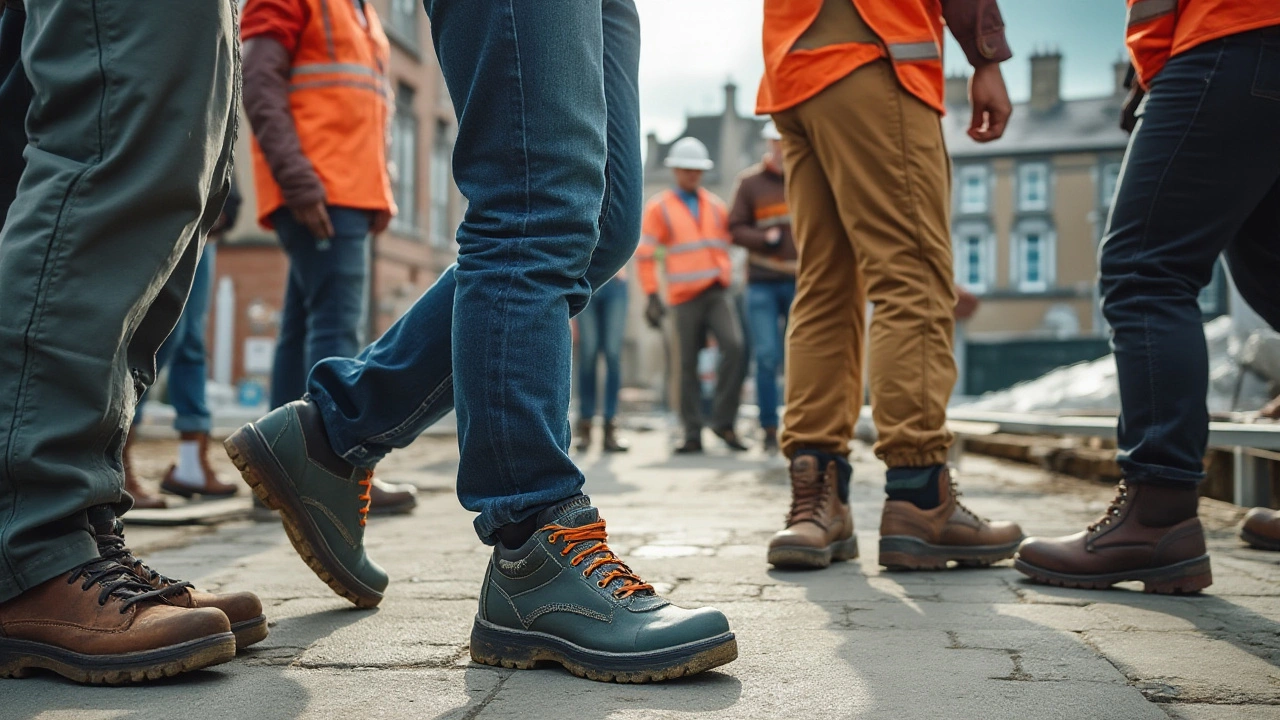When it comes to workplace safety in Ireland, the requirement to wear safety shoes might not be just a matter of personal choice but a legal necessity. The law is in place to protect workers from unforeseen dangers on the job, and it often mandates the use of protective footwear in specific sectors. Whether you're on a construction site in Dublin or working in a factory in Cork, understanding these regulations can keep you safe and compliant.
The topic of refusing safety shoes brings up multiple facets of workplace rights and responsibilities. We'll journey through what the Irish safety regulations entail, how they impact both employers and employees, and what could potentially happen if you decide to challenge these rules. Additionally, picking the right pair of boots isn't just about ticking a box—it's about ensuring comfort, safety, and adherence to the standards laid out by regulatory bodies.
- Understanding Safety Shoe Regulations in Ireland
- Employer and Employee Responsibilities
- Consequences of Refusing Safety Shoes
- Choosing the Right Safety Footwear
- Frequently Asked Questions and Tips
Understanding Safety Shoe Regulations in Ireland
In Ireland, safety shoe regulations are a key component of workplace safety laws, designed to ensure the wellbeing of employees in industries where the risk of foot injuries from falling objects, sharp items, or electrical hazards is considerable. The Safety, Health and Welfare at Work (General Application) Regulations 2007 provides the legal framework governing these aspects, placing the onus on employers to assess risks and provide necessary personal protective equipment, including safety shoes. This legal obligation means that whether you are working in sectors like construction, logistics, or manufacturing, adherence to appropriate protective footwear regulations is non-negotiable.
Emphasis on wearing the right type of protective footwear is made in legislation to mitigate accidents and safeguard workers. A wide variety of safety shoes is now available in the Irish market, ranging from steel-toe boots to non-slip and waterproof options, ensuring you can find a pair suitable for your specific workplace requirements. The Health and Safety Authority (HSA) takes safety gear seriously, enforcing regulations to promote a culture of vigilance and protection in the workplace. The penalties for failing to comply with these regulations can include fines or, in severe cases, closure of operations until compliance is achieved.
There's a common misconception that safety shoes might be uncomfortable or cumbersome; however, modern designs prioritize ergonomic balance and weight distribution, ensuring comfort without compromising protection. In your workplace, these regulations may also be accompanied by company-specific rules tailored to the unique challenges faced in your sector. A study conducted by the European Agency for Safety and Health at Work revealed that adequate protective gear could reduce workplace accidents by up to 60%, underscoring the importance of compliance.
"Ensuring workers are equipped with suitable protective equipment, like safety shoes, is critical. It's not just about following rules but about preventing harm and fostering a safer work environment," said Mary Collins, a safety consultant with over twenty years of experience in occupational health and safety.
To sum up, understanding the Irish legal landscape regarding safety shoe regulations is an essential part of workplace preparation and compliance. Ignoring these rules not only increases the potential for personal injury but also legal repercussions for both employees and employers. By staying informed and proactive, companies and their staff can create a safer working environment, ultimately benefiting productivity and morale. When you know how significant these shoes are in protecting you from occupational hazards, it becomes clear why they are integral to workplace safety strategies. So, ensuring you're equipped with the right footwear isn’t just about ticking a box—it's about actively participating in your safety and those working alongside you.
Employer and Employee Responsibilities
In Ireland, the roles of employers and employees regarding workplace safety footwear, particularly safety shoes, are crucial to maintaining a safe and compliant work environment. Both parties have distinct responsibilities that converge to foster a culture of safety. Employers, by law, must ensure that appropriate personal protective equipment (PPE), including safety shoes, is provided to their employees at no cost. This obligation forms part of their wider duty of care under the Safety, Health and Welfare at Work Act 2005, aiming to protect employees against workplace hazards. They need to assess the work environment, identify potential risks, and determine when protective footwear is necessary. This includes considering elements such as heavy machinery, construction materials, and any sharp or toxic debris on site.
Employer Responsibilities
Employers are not only tasked with providing the right gear but also ensuring that employees are trained to use it correctly. This means that simply handing out a pair of steel-toed boots isn't sufficient; there must be an accompanying explanation or demonstration, educating employees on why these boots are necessary and how they should be worn. Employers should also keep records of who has been provided with safety footwear and documentation proving that training has been administered effectively. Regular reviews and updates to the safety policies must be conducted, particularly when new hazards arise or when there's a change in operations.
The Health and Safety Authority of Ireland emphasizes, "It's the employer's responsibility to create a safe workplace, but employees also have a role in ensuring safety is maintained."
Employee Responsibilities
On the other hand, employees have their share of responsibilities when it comes to wearing work footwear. Employees are expected to actively participate in maintaining their safety and that of their colleagues. They should comply with workplace instructions and wear the safety shoes provided diligently. If an employee has concerns about the fit or condition of their safety footwear, it is their responsibility to report it to their management. Not wearing the mandated protective gear can not only jeopardize personal safety but also become grounds for disciplinary action. By law, employees must not engage in any behavior that might put themselves or their coworkers at risk, which includes willfully ignoring the use of provided PPE.
The shared commitment between employers and employees to adhere to Irish safety regulations forms the backbone of effective workplace safety measures. While employers lead the charge in supplying the gear, the onus on employees to use it correctly transforms policy into practice. With sectors varying from bustling factories in Limerick to logistics hubs near the Shannon Estuary, the specifics may differ, but the ultimate goal remains steadfast—a safer, injury-free workplace. And while most organizations recognize the value of these safety paradigms, continuous communication and education are paramount to keeping standards high and ensuring both employers and employees are clear about their roles.

Consequences of Refusing Safety Shoes
Refusing to wear safety shoes in Ireland can lead to a mix of personal, legal, and professional consequences that one might not initially anticipate. Whether you are working in a bustling city center or in the more serene countryside, the risks remain prevalent. Safety shoes serve the critical function of protecting your feet from mishaps that are regrettably common in many industries. From construction sites laden with sharp objects to factories where the risk of dropping heavy materials looms large, safety shoes are a must.
At the forefront, personal injury is a dire consequence. Injuries resulting from not wearing the proper protective footwear can be severe, often resulting in hospital visits, and lengthy recovery periods. This not only affects your physical health but can also lead to a financial strain if you are forced to take unpaid leave during recovery. The emotional toll of dealing with injuries is another aspect not to be overlooked. Beyond the personal drawbacks, legal repercussions can follow as well. In Ireland, health and safety regulations are stringent and well-enforced. Employers are mandated to provide a safe working environment, which includes enforcing the wearing of safety gear.
Failure to adhere to these guidelines can lead to fines or even lawsuits. Let's imagine a scenario where an employee refuses to wear their safety shoes and ends up injured. This could potentially lead to a lawsuit against the employer, placing an immense financial and reputational burden on the company. According to the Health and Safety Authority in Ireland, compliance with safety standards is non-negotiable. They often conduct inspections to ensure these standards are being rigorously maintained.
Professionally, refusing to comply with safety guidelines can damage your standing as a reliable and responsible employee. Employers value team members who prioritize safety, not only for themselves but for the collective well-being of their colleagues. This kind of behavior could reflect poorly in performance reviews or could even lead to termination, as companies are increasingly wary of potential liabilities. A culture of safety is not just about following rules; it's an attitude that reflects in every professional endeavor.
"The price of safety shoes is never that high compared to the cost of an injury,” mentions an industry expert in workplace safety seminars held regularly across Dublin.
Understanding these consequences allows employees and employers alike to appreciate the importance of safety footwear. Establishing clear communication and education regarding safety protocols can prevent situations where refusal leads to such adverse outcomes. By adhering to safety regulations and wearing the right work footwear, employees are not just protecting themselves, but also contributing to a safer and more productive workplace environment, here in Ireland.
Choosing the Right Safety Footwear
When it comes to selecting the right safety shoes in Ireland, making an informed decision is vital to ensure not only compliance with Irish safety norms but also comfort and durability throughout the working day. It's tempting to choose based on appearance or initial comfort, but the needs of your specific job role and workplace conditions must guide the decision. For instance, on a bustling construction site, steel-toed boots might be indispensable, offering protection against heavy falling objects and robust enough to withstand the rigors of such environments. On the other hand, someone working in a slick restaurant kitchen might prioritize slip-resistant soles to prevent accidents on wet floors. Understanding these distinctions can make all the difference in safety outcomes.
The Importance of Fit and Comfort
The fit and comfort of work footwear cannot be overstated, as these shoes will be worn for extended periods. A snug, but not tight, fit is ideal to prevent blisters and discomfort. Feet naturally swell during the day, hence trying on shoes in the afternoon or evening is sometimes recommended. Another important tip is to test them with the socks you'd typically wear at work. Proper arch support is fundamental, especially if your job involves long hours on your feet, as it reduces strain and fatigue over time. Shoes that lack this support can lead to significant discomfort and chronic conditions down the road.
Material Considerations
The material of the footwear is crucial as it can determine durability and protection levels. Leather is often recommended for its breathability and resistance, and is a common choice in the Irish work footwear market. However, synthetic materials can also provide excellent protection and may offer additional benefits like water resistance or lighter weight. Depending on the climate and workplace conditions, water-resistant coatings or more breathable fabrics can improve user experience and shoe longevity. It's worth considering the Irish weather—we’re no strangers to sudden downpours, so a good pair of waterproof safety boots might be essential, especially for outdoor workers.
Certifications and Standards
Within Ireland, and more broadly in the EU, safety footwear must meet specific standards, typically incorporating European CE marking or ISO standards that denote thorough testing and compliance. These certifications ensure that shoes provide adequate protection for the hazards specific to your line of work. Whether you're in a role that involves exposure to high heat, chemical splashes, or electrical risks, there's likely a certified shoe designed to reduce those dangers significantly. Checking for these markings before making a purchase is a smart move, ensuring that your footwear can keep up with workplace demands.
According to the Irish Health and Safety Authority (HSA), 'Employers must supply personal protective equipment, including safety footwear, that is appropriate to the worker's environment and duties.'
Cost vs. Long-Term Investment
While the initial cost of quality safety shoes might seem steep, considering them as an investment in your health and day-to-day comfort can shift perspective. Good shoes reduce the risk of workplace injuries, which can be costly in terms of medical bills and lost work days. Additionally, higher-quality footwear tends to last longer, reducing the need for frequent replacements. When budgeting for safety shoes Ireland offers, factor in the protective features, potential for longevity, and benefits they bring over time. Spending a little more upfront can save you money and trouble down the road, making it a worthy consideration for anyone earnestly contemplating safe and comfortable work attire.

Frequently Asked Questions and Tips
Let's dive into some common queries people have about safety shoes in Ireland and explore practical advice to help you make informed decisions. One question that surfaces often is: "Can I legally refuse to wear safety shoes at my workplace?" The straightforward answer in most cases is no, you cannot simply refuse. Irish law emphasizes the need for appropriate safety shoes Ireland in hazardous work environments to protect not only yourself but also your colleagues. Without the proper foot protection, a construction site in Dublin or a bustling industrial area could turn from a place of productivity into one of danger.
Employers in Ireland must provide suitable personal protective equipment, including protective work shoes, and employees are compelled to wear them. If you find safety shoes uncomfortable or unsuitable, it's crucial to express this to your employer rather than ignoring the requirement. Communication can often lead to finding a more agreeable solution without compromising your safety. Knowledge of your rights and obligations can bridge the gap between discomfort and safety.
How do I choose the right safety footwear? This question is pivotal as not all safety shoes are created equal. Start by considering the nature of your job: if you're on a construction site, steel-toed boots might be necessary; for a kitchen job, slip-resistant soles could be essential. Visit local brands such as Dubarry of Ireland for durable options. Keep in mind the local climate as well; waterproofing might be a good idea given Ireland's rainy weather.
"Appropriate footwear not only ensures safety but also comfort, leading to better workplace efficiency," says a report by the Health and Safety Authority of Ireland.
A common mistake is choosing size over comfort; always go for functionality and fit first. Ask for recommendations from colleagues who have had experience; their insights can guide you far better than mere online reviews. Inspect the construction of the shoe—pay attention to the quality of material and stitching as these factors greatly influence longevity and protection.
Lastly, some tips can vastly improve your experience with safety shoes. Work footwear rules in Ireland suggest regular maintenance of your shoes extends their lifespan significantly. Cleaning them with gentle products and storing them in a dry, cool place helps maintain their integrity. Investing in a pair of high-quality insoles might transform uncomfortable safety shoes into a perfect fit for the long hours on your feet. And remember, there's freedom in responsibly navigating Irish safety regulations, ensuring compliance affords peace of mind and protection.
